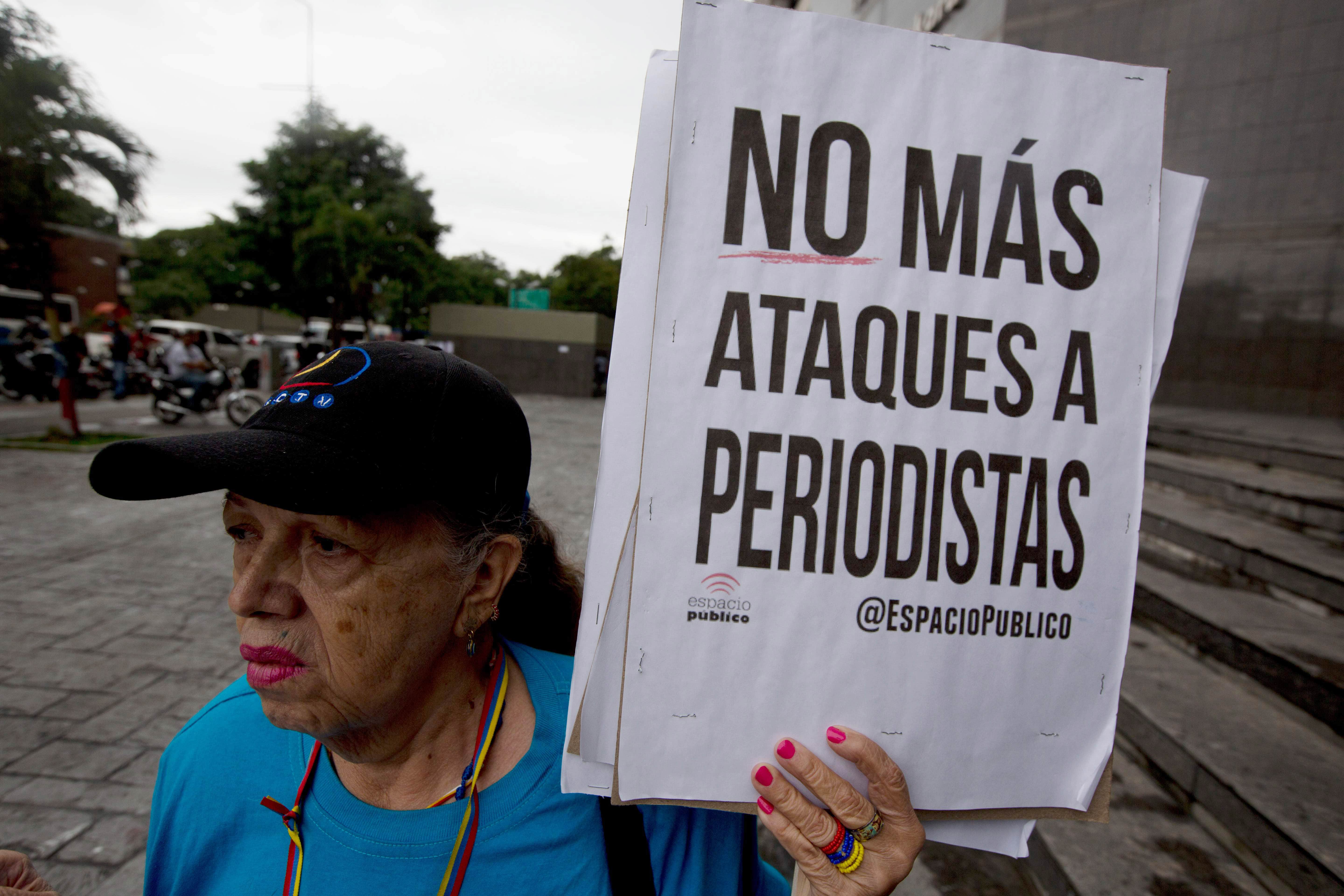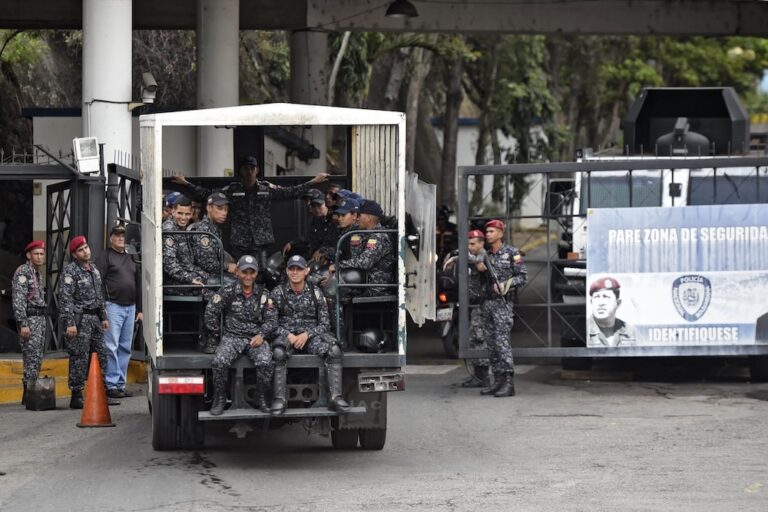“We are profoundly concerned by the recent attacks against journalists and independent media, which increase pressure on the media in Venezuela. This is especially alarming given the shortages of food and medicines in the country, the economic crisis and the intense social and political tensions."
The following is a translation of a statement that was originally published on ipysvenezuela.org on 4 August 2016.
United Nations Special Rapporteur on freedom of opinion and expression rights, David Kaye, and Special Rapporteur for freedom of expression of the Inter-American Commission on Human Rights, Edison Lanza, warned today of the continuing deterioration of freedom of the press in Venezuela.
“We are profoundly concerned by the recent attacks against journalists and independent media, which increase pressure on the media in Venezuela. This is especially alarming given the shortages of food and medicines in the country, the economic crisis and the intense social and political tensions” they stressed.
The experts called attention to the recent arrests and interrogations of at least seven journalists and people who work in media, as well as confiscations of their equipment. Mr. Lanza stated that “we are alarmed by the news that several journalists were arrested while covering lootings or informing the public of protests.”
“Security forces should protect, and not harass, reporters and journalists who are carrying out their legitimate job of informing the public,” indicated Mr. Kaye. “Threats and attacks against journalists and media are not only an infringement of these people’s rights, but they also undermine the ability of Venezuelans and individuals in other places to be informed on vitally important events.”
“Information on the latest attacks against journalists covering the impact of the recent economic crisis on the ground also deserves immediate attention,” stated Mr. Lanza. He said this while commenting on the reported attacks against journalists covering the protests against food shortages in Caracas this past June 2, and the attacks on newspapers El Aragüeño, El Caroní and El Nacional at the end of this same month.
The IACHR Special Rapporteur noted that the State has an obligation to ensure the safety of journalists and should promptly respond to allegations of violence and intimidation that they experience: “It is essential that the Venezuelan authorities act diligently and swiftly to determine the facts and punish those responsible. Additionally, allegations that the attackers belong to groups that support the government are especially concerning and require special attention.”
“Law enforcement officials’ harassment of media sources evidently makes journalists’ ability to carry out their imperative work more difficult, and it has a strong ‘deterrent effect,’ which affects all of society,” stated Mr. Kaye.
A Concerning Trend
The rapporteurs also expressed concern about recent court decisions and other measures that considerably increase pressure on media and further limit its ability to carry out work independently.
This past July 8, the Supreme Court of Venezuela ordered news websites La Patilla and Caraota Digital to refrain from publishing lynching videos on their web pages and social media. This decision may be extended to other media sources in the country.
“This recent Supreme Court decision establishes a disproportionate and unreasonable restriction that contradicts the inter-American and international standards on the right to freedom of expression. The exercising of the right to freedom of expression cannot be subject to prior censorship,” declared Mr. Lanza.
“Furthermore, we are concerned by the large number of radio stations that may be operating under expired licences given that their applications for licence renewal have been ignored for inordinate periods of time,” stated Mr. Kaye. “The international norms are clear on this matter: precisely to avoid abuses, the processes for obtaining radio broadcasting licensing must be reasonable, objective, clear, transparent and non-discriminatory.”
The rapporteurs expressed great concern about the closing of the La Barinesa radio station on June 10, which allegedly closed because its licence had expired. Mr. Lanza stated that “the adoption of extreme measures, such as closing a radio station, must be based on solid grounds, and must only be used as a last resort.”
Finally, the experts expressed their concern due to newspapers’ operations being ceased as a result of the shortage of paper for printing editions. According to information received, this year the shortage has affected the circulation of newspapers such as El Siglo de Aragua, La Mañana, Nueva Prensa, El Carabobeño and El Mío.
Mr. Kaye concluded that “the recurring lack of newspaper paper is yet another obstacle that Venezuelan media sources face, and it requires quick clarification and a solution on the part of national authorities.”
Together, the two rapporteurs sent a letter to the Venezuelan government expressing these concerns. This letter also requests clarification on the events that have occurred. The State confirmed receipt of the letter, and the experts now hope that the response to their request allows for the opening of a dialogue on this issue, and other issues related to exercising the right to freedom of expression.
Mr. David Kaye (U.S.) was appointed as Special Rapporteur on the promotion of the right to freedom of opinion and expression in August 2014 by the UN Human Rights Council.
The Special Rapporteurs take part in what is known as the Special Procedures of the Human Rights Council. The Special Procedures – the largest body of independent experts in the UN Human Rights system – is the general name for research and monitoring mechanisms of the Human Rights Council. It deals with actual situations in specific countries or thematic issues around the world. The Special Procedures experts work on a volunteer basis; they are not UN staff, and they do not receive a salary for their work. They are independent of any government or organization, and they act in their individual capacity. For more information, please visit: http://www.ohchr.org/EN/HRBodies/SP/Pages/Welcomepage.aspx
Mr. Edison Lanza (Uruguay) was appointed as Special Rapporteur for freedom of expression in July 2014 by the Inter-American Commission on Human Rights.
The Office of the Special Rapporteur for Freedom of Expression was created by IACHR to promote the defence of the right to freedom of thought and expression in the hemisphere, given the key role this right plays in consolidating and developing the democratic system. For more information, please visit: http://www.oas.org/en/iachr/expression/mandate/Rapporteur.asp
UN Human Rights, country page – Venezuela: http://www.ohchr.org/SP/Countries/LACRegion/Pages/VEIndex.aspx



